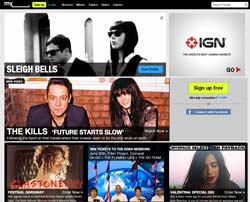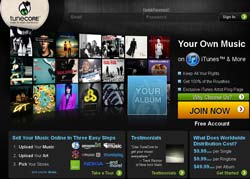 Sharing your music online
Sharing your music online
So you’ve learnt your instrument, composed your piece, recorded it, edited it and its good to go. How do you get it out there? There are a number of ways that you can make your tunes available to the wider public than you immediate friends and family by publishing online.
File Format
Raw audio files tend to be very large and you will probably have to compress the file and save it in a different file format to upload it onto the internet for sharing. Make sure that you keep the original intact when you do this and check any guidelines for the service that you're going to use - some may require higher or lower file compression.
Compression and file format are related, however they are not the same thing. Compression involves passing the file through software that identifies information that can be safely removed from the file with minimal effect on the sound quality. The harder the file is compressed, generally the greater the effect on the sound quality. There are a variety of file formats for audio (and video) content and some of these allow for greater compression (smaller file sizes) with less reduction in sound quality.
The most widely used file format for audio is the MP3 as it can be used by most media players: when saving a track as an MP3 you can usually choose how heavily to compress it. Other audio formats have been made by software vendors such as MicroSoft’s Windows Media Player (.wma), Real Player (.ra), Apple's Advanced Audio Coding (.aac) used by iTunes etc. These often allow for greater compression but are proprietary so can only be listened to using the specified player.
Delivery
- Streaming
- Streaming music is a technology that allows you to listen to music as if to a radio station, only over the internet. The music is sent to the listener’s computer in a 'stream' but they cannot collect it i.e. there is no file left on their computer, so they have to listen to (or watch) it as it streams.
- Downloads
- Music downloads make a copy of the audio file on your computer. Depending on the license and file format, you then own a copy of that track which you can copy to your MP3 player and even re-mix or mash-up to make something new.
- Podcasting
- Podcasting is a specific form of download where the files are contained in an RSS feed. To get the file the user subscribes to the RSS feed with a special podcast reader which will download any new files as they are added to the feed. The files are then ready to be copied to the user’s MP3 player and listened to at their leisure. Podcasting can be a great way to get your music to people as they only have to subscribe once.
Services
- MySpace
- MySpace right from the start has been a major location for bands and musicians to set up pages from which fans could freely download their music and videos. Its free to use and more than one band has been discovered on MySpace.
- YouTube
- YouTube is the world’s biggest video sharing web site and is so popular that they have held their own video awards. If you’re keen to skip the whole audio phase and move direct to video YouTube could be the place for you.
- SoundClick
- SoundClick can handle all the hosting, posting, and licensing through Creative Commons for you.
- Jamendo
- Another online community which is using the Creative Commons license, with Jamendo your can upload your music and listeners can choose to donate to the artists whose music they enjoy.
- TuneCore
- TuneCore is a music delivery and distribution service that gets artists’ original music (even cover versions) and record label releases up for sale on iTunes, eMusic, Rhapsody, Amazon, etc without asking for your rights or taking money from the sale or use of your music.
Could be just the thing is you’re out to make money from your music. Make sure that you check out how it works - it has lots of good information about file compression and other technical aspects of producing audio and explains all the details of the service.
Licensing & copyright
One of the biggest issues on the web today is around the use and distribution of media such as music and video of TV shows and movies and the intellectual property rights of their creators. Its a pretty thorny issue but one you need to consider if you’re going to put your music online.
Copyright
Copyright is widely misunderstood but basically if you create something new then you own the copyright on it, whether you use a copyright symbol © or not. Generally people have the right to read/listen to/watch legally obtained copyrighted material but not to copy it (with some fair-use provisions for educational purposes) or distribute it to others. Copyright runs out after a certain period after which time anyone can use the work as it is termed in the "public domain". There are international copyright agreements but many countries operate variations of the details.
- Copyright Protection in New Zealand
- From the Ministry of Economic Development
Creative Commons
Creative Commons enables you publish your creations online indicating to the public what they’re authorised to do with them. It’s a "some rights reserved" policy, somewhere between public domain and full copyright and there are various flavours that allow for more or less rights. For example you might be happy for people to copy and share your music but not to change it or sample from it. There are no technical controls however, you are completely dependent on your listeners doing the right thing and adhering to your license.
Digital Rights Management (DRM)
Digital Rights Management software seeks to ensure that media downloaded has been paid for and is only used appropriately, for example by the user who paid for it on their own equipment, not copied or made available for free to others so its a full copyright system. If you want control over how your work is used and distributed you may want to investigate DRM systems.
- Digital Rights Management Wikipedia article







